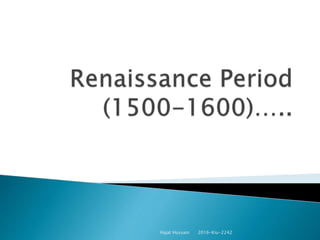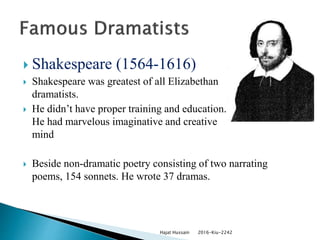Renaissance Period 1500-1600 /English Literature History
- 3. ’üĮ Prepared by Hajat Hussain ’üĮ Reg No. 2016-kiu-2242 Hajat Hussain 2016-Kiu-2242
- 4. ’üĮ Introduction ’üĮ Characteristics ’üĮ Renaissance Drama ’üĮ Famous Dramatists ’üĮ Renaissance poetry ’üĮ Famous poets ’üĮ Renaissance prose ’üĮ Famous prose writers Hajat Hussain 2016-Kiu-2242
- 5. ’üĮ This period is also called the Elizabethan Period or Age of Shakespeare. ’üĮ Renaissance means rebirth. ’üĮ The Renaissance began in Italy, especially in arts and architecture Hajat Hussain 2016-Kiu-2242
- 6. ’üĮ With the fall of Constantinople in 1453 A.D by invasion of Turks, the Greek scholars who were residing there, spread all over Europe and Revival of Learning of Greek in 14th and 15th century. ’üĮ The essence of this movement was that ŌĆśman discovered himself and the universe. Hajat Hussain 2016-Kiu-2242
- 7. ’üĮ Discoveries took place in other fields e.g Columbus discovered America, Copernicus discovered Solar System, Books were printed. ’üĮ In England change in religion and politics when Henry VIII made himself Church of England. He cut all contact with Catholic Church and Protestantism became more popular. Hajat Hussain 2016-Kiu-2242
- 8. ’üĮ The chief characteristic of Renaissance was its emphasis on Humanism. ’üĮ Renaissance was started in Italy and became popular in England in Elizabethan period. This movement focused on ŌĆśthe proper study of mankindŌĆÖ. The first Englishman who wrote under influence of Greek was Sir Thomas written Utopia in Latin. Hajat Hussain 2016-Kiu-2242
- 9. ’üĮ The second characteristic was discovery of external universe. Writers directed their gaze inward, became deeply interested in the problems of human personality. Writers prefer individuality. ’üĮ Another characteristic was that men came to be regarded as responsible for their own action. Hajat Hussain 2016-Kiu-2242
- 10. ’üĮ In this period the most memorable achievement in literature was in the field of drama. ’üĮ A great development was made in the study of Latin drama and growth of practice of acting plays in English and Latin. ’üĮ These plays brought educated classes into touch with a drama. Hajat Hussain 2016-Kiu-2242
- 11. ’üĮ At mid of 16th century writers attempts to write plays in English on Latin model. e.g John Still wrote Grummar GurtonŌĆÖs Needle ’üĮ Elizabethan drama was dominated by ŌĆśUniversity WitsŌĆÖ a group of literary men. Marlowe was central and Lyly, Greene, Peele were minor stars. ’üĮ Shakespeare was greatest of all Elizabethan dramatists. Hajat Hussain 2016-Kiu-2242
- 12. ’üĮ Shakespeare (1564-1616) ’üĮ Shakespeare was greatest of all Elizabethan dramatists. ’üĮ He didnŌĆÖt have proper training and education. He had marvelous imaginative and creative mind ’üĮ Beside non-dramatic poetry consisting of two narrating poems, 154 sonnets. He wrote 37 dramas. Hajat Hussain 2016-Kiu-2242
- 13. ’üĮ His work is divided into 4 periods ’üĮ 1st Period (1577-1593) This was early period. In this period he wrote three parts of Henry VI and Titus Andronicus. His first comedies were LoveŌĆÖs LabourŌĆÖs Lost, The comedy of errors etc. ’üĮ His first tragedy was Romeo and Juliet Hajat Hussain 2016-Kiu-2242
- 14. ’üĮ In this period he wrote great comedies and chronicle plays like Richard II, King John, Henry IV, I, II,V, As you Like It etc ’üĮ 3rd Period (1601-1608) In this period he wrote great tragedies and bitter comedies. The tone is grave and emphasis on evil. He wrote Julius Caesar, Hamlet, Macbeth, All is Well that Ends Well, Othello, King Lear and Timon of Athens. Hajat Hussain 2016-Kiu-2242
- 15. ’üĮ In this period he wrote comedies and dramatic romances. ’üĮ There is a decline in the power of expression and thought. He wrote Cymberline, The Tempest and The WinterŌĆÖs Tale. ’üĮ His plays and poetry are like a great river of life and beauty. Hajat Hussain 2016-Kiu-2242
- 16. ’üĮ In 1587 his first play Tamburlaine was produced and took public interest. ’üĮ The greater and best play was The Doctor Faustus, a tragic comedy. The story was about a scholar who sells his soul to the Devil for power. Died at the end. ’üĮ The Jew of Malta, the third tragedy was about a clever Jew named Barabas, who became a governor of Malta and at the end of play Barabas was killed. Hajat Hussain 2016-Kiu-2242
- 17. ’üĮ Edward II was his last play. ’üĮ His plays were different from ShakespeareŌĆÖs plays. He introduced heroes with superpowers, great strength and vitality. ’üĮ He is known as The Father of English Dramatic Poetry. Hajat Hussain 2016-Kiu-2242
- 18. ’üĮ He wrote a number of plays. The most famous was Euphues and best known are Compaspe, Endymion, Midas and Sapho and Phao. Hajat Hussain 2016-Kiu-2242
- 19. ’üĮ Poetry took a new trend. Under the influence of Renaissance the people of England were infused with freshness, enthusiasm and vigour. ’üĮ The poetry of this period opens with the publication of a volume known as TottelŌĆÖs Miscellany by Sir Thomas More and Earl of Surrey. ’üĮ Both attempted the blank verse and experimented a great variety of metres. Hajat Hussain 2016-Kiu-2242
- 20. ’üĮ The rhyme scheme of most sonnets in English, including Shakespeare is generally ABABBCDCDEFEFGG this is called Elizabethan scheme. ’üĮ The words rhyme in every other line, except the final line called a couplet. Hajat Hussain 2016-Kiu-2242
- 21. ’üĮ Philip Sidney (1554-1586) ’üĮ The greatest of these early Elizabethan poets was Sir Philip Sidney. He was a many sided person, a soldier, courtier and a poet. Queen Elizabeth called him one of the jewels of her crown and he was considered one of the ripest statesmen of the age. ’üĮ As a literary figure, he made his mark in prose as well as in poetry. Hajat Hussain 2016-Kiu-2242
- 22. ’üĮ His prose works are Arcadia and the Apologie for Poetrie. ’üĮ His great work in poetry was the sequence of sonnets called Astrophel and Stella. ’üĮ His Defence of Poetry was also very famous. Hajat Hussain 2016-Kiu-2242
- 23. ’üĮ The greatest name in the Elizabethan Poetry was Spenser, who may be called the poet of chivalry and Medieval allegory. ’üĮ The Faerie Queene written in the form of an allegory deals with petty intrigues, corrupt dealings and clever manipulations of politicians in the court of Queen Elizabeth. ’üĮ ShepherdŌĆÖs Calendar is pastoral poem written in an artificial classical style. Consisting of 12 parts and each devoted to the month of the year. Hajat Hussain 2016-Kiu-2242
- 24. ’üĮ Astrophel, an elegy which he wrote on the death of Sir Sidney. ’üĮ Hymns which are characterized by melodious verse were written in honor of love and beauty. ’üĮ His Amoretti consisting of 88 sonnets. ’üĮ His poetry is surcharged with noble ideas and lofty ideas. Hajat Hussain 2016-Kiu-2242
- 25. ’üĮ There is no harsh note in all his poetry. He was poet of imagination. His greatest contribution to English Poetry is the Spenserian stanza. It is used by many poets. ’üĮ Charles Lamb called him ŌĆśSpenser is the poetsŌĆÖ Hajat Hussain 2016-Kiu-2242
- 26. ’üĮ This period was the period of origin of modern English prose. Prose was used as a vehicle of various forms of amusement and information. Books on history, travel, adventure and translation of Italian stories appeared in a large number. ’üĮ There were large number of prose writers, only Sidney and Lyly made a solid contributions to the English Prose style. Hajat Hussain 2016-Kiu-2242
- 27. ’üĮ People of England took delight in the flowery words and graceful. ’üĮ The Elizabethans loved decorative modes of expression and flowery style. Hajat Hussain 2016-Kiu-2242
- 28. ’üĮ John Lyly (1554-1606) ’üĮ The first author who wrote prose in the manner that Elizabethans wanted, his Euphues was popular on highly artificial and decorative style. It was read and copied by everyone. ’üĮ The word Euphuism became common description of an artificial style. Hajat Hussain 2016-Kiu-2242
- 29. ’üĮ Arcadia is the first English example of prose pastoral romance, which was imitated by various English authors. ’üĮ The main attraction lies in its style which is highly poetical and exhaustive. One word is used again and again in different senses. Hajat Hussain 2016-Kiu-2242
- 30. ’üĮ A Critical History of English Literature by B.R Mullik ’üĮ History of English Literature By David Daiches Hajat Hussain 2016-Kiu-2242































